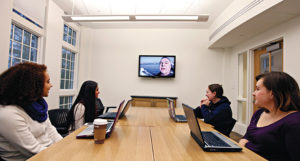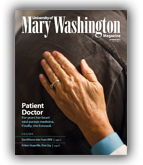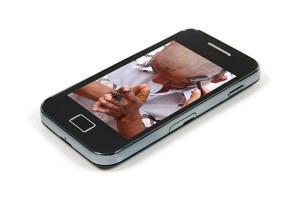
Last semester, instead of taking students abroad, professor Donald Rallis headed out to places like Turkey, Rwanda, and Cambodia and taught from afar. He tweeted photos, insights, and assignments and sent video and blog posts to lead students through his world geography class. Below is a photograph Rallis shot in October 2012 of a Cambodian man having his head shaved in mourning for King Norodom Sihanouk. Photo by Norm Shafer.
Three classes of University of Mary Washington students traveled the globe during spring semester without ever leaving campus.
The 115 students were in an online regional geography course taught by Associate Professor of Geography Donald Rallis.
As Rallis journeyed to more than 15 cities in 11 countries, the students followed along via an online teaching site, Twitter, YouTube, and blog posts. Through Rallis, they experienced a medieval cathedral in Worcester, England; interviewed a French student at Sorbonne University in Paris; and surveyed a lush tea plantation outside Rwanda’s capital city of Kigali.
“It’s like I’m there with Dr. Rallis,” said Jennifer Greenwood ’16, who plans to major in geography because of Rallis’ class. “It’s amazing to be able to interact with someone who is across the globe. I’m able to connect on a personal level. I’m learning while he’s learning.”
The ambitious course was the first of its kind at the University, and one of the first launched under an online learning initiative at UMW aimed at providing exceptional liberal arts and sciences experiences in an online environment. The Center for International Studies, the Department of Geography, and the Teaching Center provided some funding, and Rallis bore other costs.
He started the sessions in person in January, lecturing from a traditional Monroe Hall classroom. Then he began his journey through Europe, Africa, and Asia.
He met the classes for 2½ hours each week, streaming live through an online teaching site. Students could connect wherever their computers were – in groups at a coffee shop or alone in their rooms. Rallis augmented class discussions with his photos and videos, and he used blog posts to share his insights on the food, politics, and religion of each region’s inhabitants.
A native of South Africa, Rallis is an avid traveler and photographer who has led study-abroad trips to Cambodia, South Africa, and Madagascar. He’s an expert on apartheid and many political and cultural developments throughout the world.
Rallis has taught world regional geography face to face for the past 14 years. He has tested the feasibility of a virtual course since 2008, when he conducted geography lectures from Guangzhou, China. Then, he relied on an unpredictable Internet connection and PowerPoint slides to deliver his lessons.
This spring, with much-improved technology, Rallis experienced few technological glitches. But he learned that “live” classes don’t stick to a course outline. “The real world doesn’t present itself in syllabus-ready format,” Rallis said. “And learning in it is a vastly different experience” from learning via textbook.
During the first sessions, the six- to eight-hour time differences between the U.S. and his location tested his classroom delivery. He quickly adapted, conducting fieldwork, taking photographs, and capturing video to spark class discussions that he delivered in the wee hours of the morning from his hotel room. And his 18-hour flight from Johannesburg to the Malaysian island of Penang allowed him only 15 hours to recover from jet lag before class.
“The real world doesn’t present itself in syllabus-ready format.”
– Donald Rallis
Serendipity led to the most compelling class experiences. In England, a church service at a Worcester cathedral sparked a lesson on the roles of religion in the U.S. and Europe. In Paris, Rallis met a second-year French student at the Sorbonne, and, in Istanbul, he encountered a recent UMW alumna traveling in Turkey.
In turn, Rallis has witnessed a level of student engagement unlike any he’s experienced during his 25 years of teaching.
Sequoi Phipps ’16 said Rallis’ online lessons went beyond what she would have expected from a conventional class. “Dr. Rallis pulls from every area,” she said. “We don’t just look at geography and the architecture and the people. We look at the culture and how people interact with other cultures. He makes you think from so many angles.”

